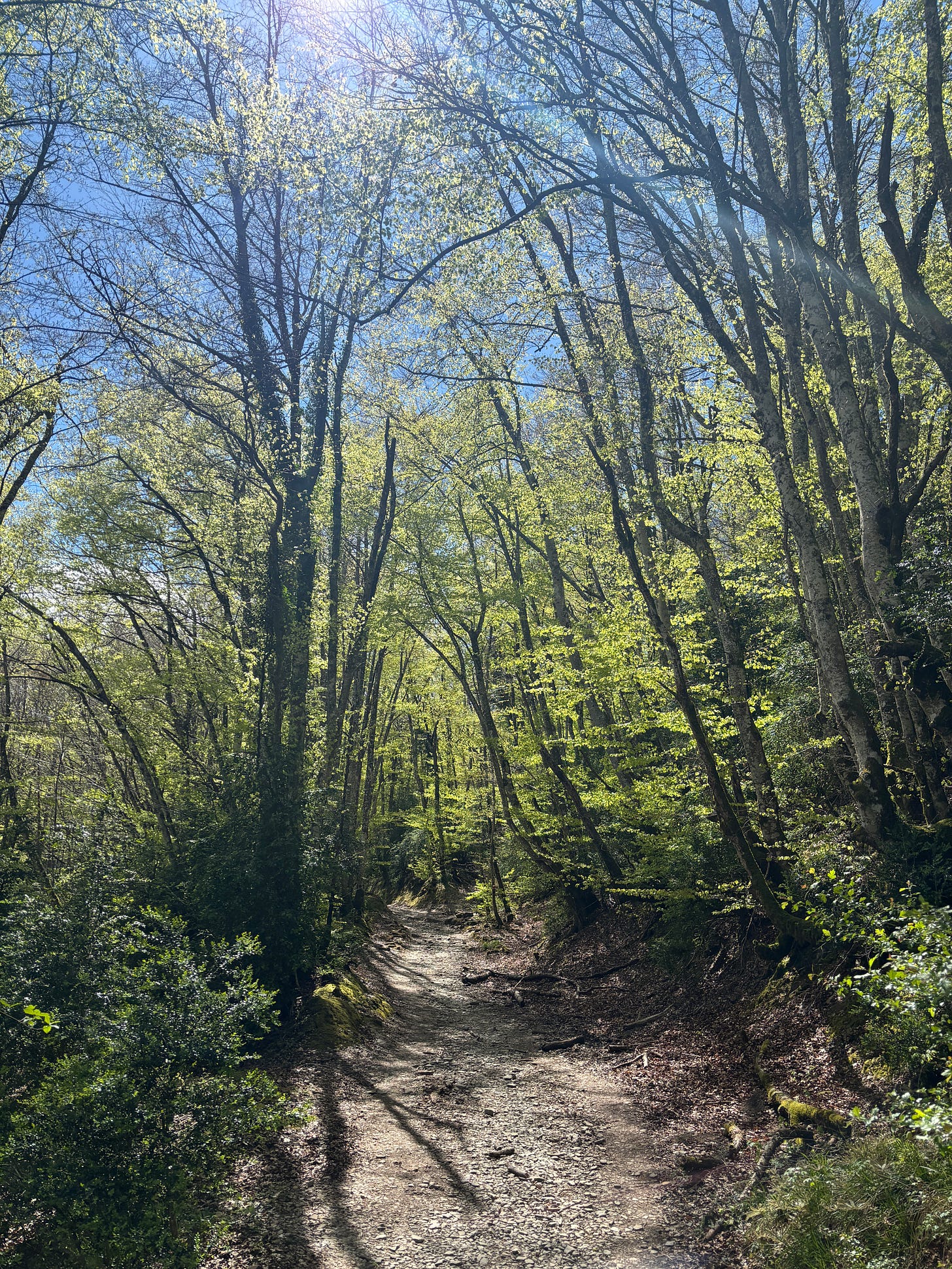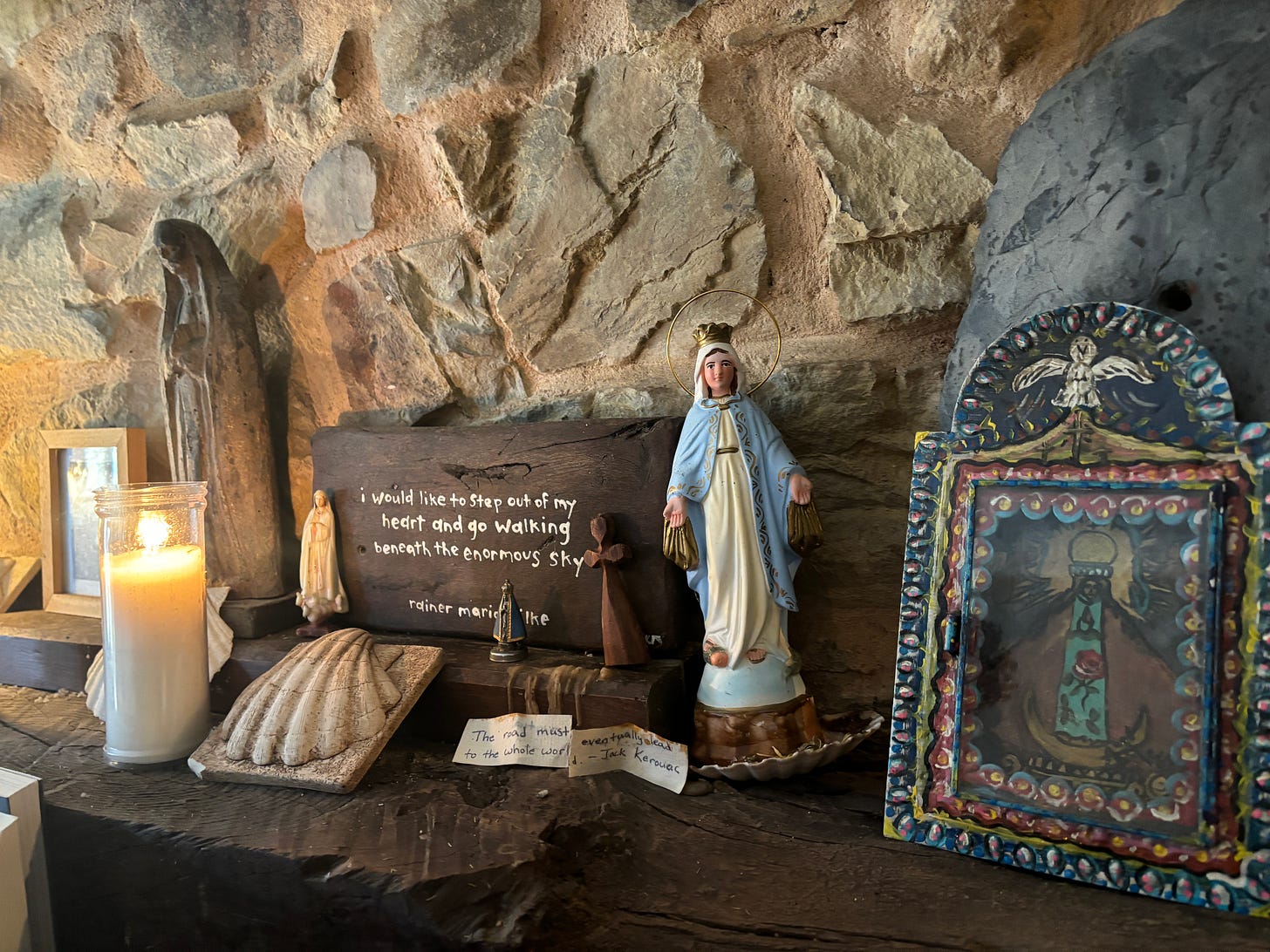Compassionate thoughts for us ice-age brained Homo Sapiens living in late stage capitalism
from a dilettante anthropologist
Dopamine Withdrawal
A few days ago I got a text from my sister asking how re-entry after the Camino has been for Eric and me. “Dopamine withdrawal is real”, she compassionately added.
And suddenly I understood why I have been scrolling Instagram and mindlessly eating Trader Joe’s snacks and on-line shopping for stuff I don’t really need - because I just came home from getting to be uncomplicatedly human.
Remember: this is all new for us.
When I am having a hard time functioning well, I try to find compassion for myself by thinking anthropologically. For instance, my sister’s text made me realize that I am experiencing dopamine withdrawal after spending weeks walking 10-18 miles each day. So I can either judge myself harshly for this and insist I stop being so pathetic, or I can remember that human beings have existed for 300,000 years and for 290,000 of those we were hunter-gatherers. And for 299,855 of those we didn’t have light bulbs, and for 299,906 we didn’t have Twinkies. Which means post-industrial life is super new; our brains and bodies adapted over hundreds of thousands of years to live in a way that couldn’t be farther from what we think of as “normal”: cars and concrete and Cocoa Puffs and condominiums. And maybe THAT (and not some deep personal flaw) is why life can, at times, feel hard.
Really old hardware. Completely unheard of software.
So when this world feels overwhelming to me, I try and remember what I learned from Sebastian Junger - that a baby born today is biologically identical to a baby born during the ice age. Which means we are constantly trying to run Mac OS 14 Sonoma on 1984 Apple Macintosh computers and they keep glitching out: anxiety, loneliness, depression, addiction, disease.
I’ve written before about how the human psyche didn’t develop to be able to respond to and hold the information about every form of suffering and violence that happens to every person each minute of the day across the entire planet. Our psyches were developed to respond to and hold the information about the suffering and violence that is happening in our foraging band, tribe or village.
I wonder sometimes if neurosis is a byproduct of brains which are no longer being occupied with foraging for food all day and making sure a wooly mammoth doesn’t sneak up on us. Now those big brains are just sort of free to feel bad about ourselves because we eat too much junk food (calorie dense foods were scarce for most of human history, so if you found something sweet, like fruit, your brain evolved to tell you “EAT IT ALL”. Our brains still do this, but now it’s in response to Skittles - artificially colored and flavored to imitate fruit).
Reading Cues.
I’m obviously not an anthropologist, or a psychologist, or historian so I am way out of my depth here, but I’ve never let that keep me from holding forth so here we go: For most of human history we survived by living with not apart from each other. We evolved to be able to read social cues about ourselves to insure our behavior allowed us to remain in community.
But now, our adorable little ice age brains are taking in and responding to thousands of messages about ourselves each day, not from the people surrounding us who we rely on and who rely on us, but from persuasive advertisements, and memes and Facebook comments.
And when someone is shitty to me in the comment section my para-sympathetic nervous system, bless her heart, interprets it as “danger” - the kind that feels like I am about to be left behind by my band of foragers and I need them to survive.
The problem we face is that we have paleolithic emotions, medieval institutions, and god-like technology. - E.O. Wilson
So all of that is to say, perhaps we are maladapted for the lives we are living. The comfort and convenience of modern life (climate controlled buildings, airplane travel, manufactured foods -none of which I myself am terribly eager to give up) has cost us more than we realize.
Trying to think anthropologically helps me have compassion for all of us, but it also has helped me understand why
the Camino is not that special.
It is an unbelievable luxury and privilege to spend weeks walking in Spain. This is not something that is accessible to most people (due to time, money and physical limitations) and I am deeply grateful to have had the honor.
And yes, the Camino de Santiago is a 1,000 year old religious pilgrimage and I would never downplay the beauty of that.
But in response to my sister’s text about dopamine withdrawal, for me the Camino feels transcendent mostly because of how deeply and uncomplicatedly human the experience is: moving your body all day through beautiful landscapes, and relying on other people who are doing the same.
But what do you give up to be able to do this? The things we have increasingly sought in this culture: comfort and convenience (two things I LOVE, by the way. For most of my life I considered any form of discomfort to be a CRISIS.)
Humaning as self-help
So here is what helps me when I start getting neurotic. I try to remember that nothing is wrong with me…I am simply having a healthy reaction to an unhealthy way of life.
And then I try and stop ordering shit on Amazon be as basically human as possible:
I go outside.
I walk. A lot.
I eat food made out of food.
I make myself be around other people, preferably while collectively doing something.
I sing with others.
I touch and am touched.
I try to be of service to others. (easy)
I try to recieve help from others. (much harder)
Ok, that’s what’s been on my mind. Now I’m gonna go outside for a walk.
I’m curious: what else is uncomplicatedly human, something our ancestors also did, that we can add to this list?
And what helps YOU feel some compassion for yourself?
Related Posts:








Alexander John Shaia (who used to live in Santa Fe and now lives in Muxia at the end of the Camino) has written a helpful book about returning from the Camino. I wasn't walking the Camino, but I had a dramatically overstimulating couple of weeks recently. Digging in my garden and caring for the perennials (who are blooming like crazy just now) is tremendously helpful. I told my neighbor "I garden because it is both cheaper (and prettier) than working with a therapist."
So true - I just stepped down as CEO of a sustainability NGO after literally 30 years of being caught up in strategy for battles (for the good - but still battles) on multiple fronts all the time with more moneyed and powerful interests (not to mention the ceo-ing part of endless financial pitching and anxieties...
I then 1) drove across country by myself, visiting and reconnecting with old friends, 2) visited with family on the East Coast and in France for weeks, 3) walked the Fisherman's Trail in Portugal for a week with my oldest best friend, and portions of the Camino Portuguese with my loved college roommate, 4) visited the rest of my close family in France for a week - dinners, hikes, picnics with 15+ of us of all ages. Now I have spent 6 weeks at home, catching up with more old friends, and working in my house and gardens, pulling them back from their neglected state (due to all that professional overwork!)
My body has moved out of fight or flight mode, my ability to sleep, cook and eat delicious foods, regulate moods, enjoy every day as a seemingly unlimited space to take up whatever activity I feel drawn to...has burgeoned day by day. As you say - being in nature, doing the tasks of living (e.g chop wood, carry water), walking, connecting with beloveds - feels like the way I as a human am meant to live.
I'm sure I'll engage in political.activism again - the times call for it, my skills are well suited to it, and I have begun dipping a toe in - but this expansion of my ability to live in specific moments, unburdened by the constant need to grasp information, determine next actions, fit personal life into narrow boundaries - feels heavenly, like being truly alive 'as a being , not a doing'.